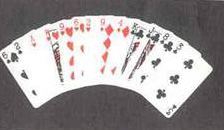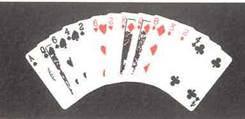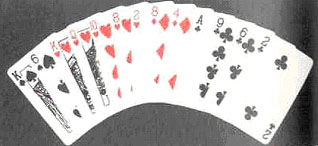OPENING BIDS
Most modern players value their hands by means of the well-known Milton Work count of 4 for an Ace, 3 for a King, 2 for a Queen, and 1 for a Jack.
Suits
The player who opens the bidding with a bid of One of a suit promises to make a further bid if his partner responds with One in a higher-ranking suit, or Two in a lower-ranking suit. For this reason a player should not open unless he can see a sound rabid in his hand over his partner’s most likely response.
The strength to justify an opening bid varies, but in general it may be said that a hand totaling at least 13 points should be opened. It is clear, however, that the more points a player holds the less length does he need in the trump suit, and the fewer points in the hand the greater must be the length in the trump suit.
With less than 13 points in the hand the practice is to open an 11 or 12 point hand with a reasonable five-card suit, and with only 10 points in the hand, sometimes less, a player needs a reasonable six-card suit, or two five-card suits.

Open One Heart. The hand totals only 11 points, but the heart suit is worth showing and if it is not shown at once it may be too late.

Open One Spade. The hand totals only 11 points, but is strong by reason of its distribution. With two suits of equal length it is proper to bid the higher ranking cards before the lower-ranking one.

Open One Spade. The hand totals a mere 10 points, but the six-card spade suit is too good to be held back.
A pre-emptive bid is defined as an opening bid at the level of Three or higher. It is a bid of great value because either it prevents the occonents from entering the auction or compels one of them to bid at a level that is dangerously high when he has no notion of what poker cards his partner may be holding.
Postulating that the bid of Three is weak and that an opponent holds strength in the other three suits, the most practical way of countering the pre-empt is to bid Three Diamonds over Three Clubs and Three No-Trumps over Three spades, Hearts or Diamonds. Either bid invites partner to bid his best suit.

When an opponent has bid a suit at the level of One, a player should enter the auction only if he can be reasonably sure that his bid, if passed out, will not be defeated by more than two tricks if vulnerable and three if not vulnerable. This general poker rules, however, must be accepted with some reservation.
It would, for example, not be wrong for a player who holds to bid One Heart over an opponent’s one Diamond. The bid might have prove costly, but not very often, and it is cowardly not to contest the part score for fear of the worst happening.
A player has a right to assume that even if his partner has a blank hand and only two or three low hearts, the hand will win three poker tricks in hearts and one in each of the black suits.
